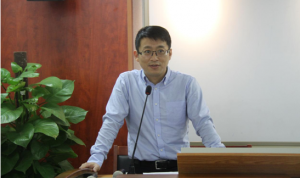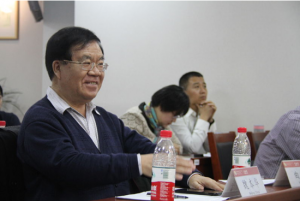Macro-Finance Salon (No. 44): World Economy and China
2016-12-17 IMI Dr. Hua pointed out in his speech that we are now in the post-global-financial-crisis era. The global economy has entered into a New Normal: the growth recovery is weak and below expectation. Those western developed economies have adopted close-to-zero or even negative interest rate in their monetary policies to stimulate the economy, but the recovery is slower than expected. The US economic recovery is better, but still not strong enough, indicated by the high degree of uncertainty in FED’s act in raising the interest rate. Emerging economies have been hit by a capital outflow caused by US dollar's appreciation and china’s economic slowdown. The prices of raw materials including oil slump and economic growth slows down. The New Normal hinders global trade. Its growth rate was higher than that of economy before the crisis, now it is lower. At the same time, in the context of real income stagnation, unfair and substantial expansion, populism, anti-globalization movement began to rise in western developed economies. Dr. Hua believes that the current global economy is urgently needed to implement "structural reform" to improve productivity and to achieve inclusive growth.
Dr. Hua also pointed out that after the financial crisis, China's economic restructuring and transformation, and upgrading has achieved substantial progress. The economy is rebalanced and embarked on the road of sustainable development. Production is transitioning from the secondary industry to the tertiary industry. Demand is changing from the external demand to domestic demand, from investment to consumption. When the global economy shrouded in the shadow of anti-globalization, China should go against the tide and actively promote an innovative, invigorated, inclusive, and interconnected globalization . The inclusion of the RMB in the SDR marks a milestone in China's achievements in reform and opening up to the outside world and reflects the expectation that China will further push forward reform and opening-up.
Dr. Hua pointed out in his speech that we are now in the post-global-financial-crisis era. The global economy has entered into a New Normal: the growth recovery is weak and below expectation. Those western developed economies have adopted close-to-zero or even negative interest rate in their monetary policies to stimulate the economy, but the recovery is slower than expected. The US economic recovery is better, but still not strong enough, indicated by the high degree of uncertainty in FED’s act in raising the interest rate. Emerging economies have been hit by a capital outflow caused by US dollar's appreciation and china’s economic slowdown. The prices of raw materials including oil slump and economic growth slows down. The New Normal hinders global trade. Its growth rate was higher than that of economy before the crisis, now it is lower. At the same time, in the context of real income stagnation, unfair and substantial expansion, populism, anti-globalization movement began to rise in western developed economies. Dr. Hua believes that the current global economy is urgently needed to implement "structural reform" to improve productivity and to achieve inclusive growth.
Dr. Hua also pointed out that after the financial crisis, China's economic restructuring and transformation, and upgrading has achieved substantial progress. The economy is rebalanced and embarked on the road of sustainable development. Production is transitioning from the secondary industry to the tertiary industry. Demand is changing from the external demand to domestic demand, from investment to consumption. When the global economy shrouded in the shadow of anti-globalization, China should go against the tide and actively promote an innovative, invigorated, inclusive, and interconnected globalization . The inclusion of the RMB in the SDR marks a milestone in China's achievements in reform and opening up to the outside world and reflects the expectation that China will further push forward reform and opening-up.
 Through in-depth analysis, Dr. Hua stressed that in the current era of weak global economic growth, the task to let the Chinese economy continue to be full of vitality, leading the world economy inclusive growth, to achieve mutual benefit and win-win, is in need of China wisdom. He hoped that we can work together to provide solutions for China and the global economy and make new contributions to the development of the Asia-Pacific and global economy.
Through in-depth analysis, Dr. Hua stressed that in the current era of weak global economic growth, the task to let the Chinese economy continue to be full of vitality, leading the world economy inclusive growth, to achieve mutual benefit and win-win, is in need of China wisdom. He hoped that we can work together to provide solutions for China and the global economy and make new contributions to the development of the Asia-Pacific and global economy.

